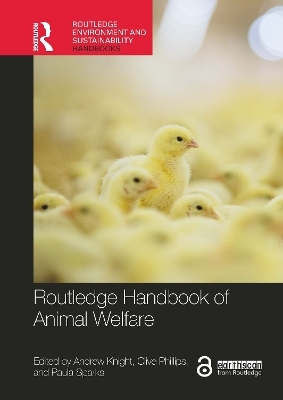
Routledge Handbook of Animal Welfare
Routledge (Verlag)
978-1-032-32575-0 (ISBN)
In recent years there has been increasing attention paid to our complex, multifaceted relationships with other animals, and in particular, the depth and breadth of various societal uses of animals. This has led to a reconsideration of their moral and social status, which has sometimes challenged the interests of those who use animals. In such a contested domain, sound evidence and reasoning become particularly important. Through firm commitment to such principles, this book explores the biological foundations for the moral consideration of animals and for evolving conceptualisations of animal welfare. It reviews in detail the welfare concerns associated with numerous forms of animal use. The inclusion of key recent developments such as climate change, pandemics, and antimicrobial resistance, ensures this text is among the most current in its field. The ethical implications of the various uses of animals by society are considered, and chapters provide important recommendations for reforms of practice, law, or policy. The status of animal law internationally, and in major world regions, is reviewed. Finally, the book considers human behavioural change and strategies for improving stakeholder communication and education.
The handbook is essential reading for students and scholars of animal welfare, animal law and animal ethics everywhere, and for policy-makers and other professionals working in the animal welfare sector.
Andrew Knight (MANZCVS, DipECAWBM (AWSEL), DipACAW, PhD, FRCVS, PFHEA) is a Professor of Animal Welfare and Ethics, and Founding Director of the Centre for Animal Welfare, at the University of Winchester, UK. He is also an Adjunct Professor in the School of Environment and Science at Griffith University, Australia. Prior to working in academia, he practised veterinary medicine for nearly a decade. Clive JC Phillips (BSc, MA, PhD) was Australia’s first Professor of Animal Welfare, at the University of Queensland, Australia, and foundation director of the Centre for Animal Welfare and Ethics. He previously lectured at the University of Cambridge and the University of Wales, UK. His books include Principles of Cattle Production (third edition, 2018), The Animal Trade (2015), and The Welfare of Animals: The Silent Majority (2008). He has authored about four hundred scientific journal articles. He chairs the Queensland and Western Australia Governments' Animal Welfare Boards, is editor-in-chief of the journal Animals, edits an Animal Welfare Series, and is Director of the Humane Society International. Paula Sparks (LLB (Hons), BL) is a Visiting Professor at the University of Winchester, UK, where she teaches animal law. She practised as a barrister at Doughty Street Chambers in London before leaving the bar in 2018 to pursue a full time role with the UK Centre of Animal Law (A-LAW), a charity whose vision is a world where animals are fully protected by law. She frequently lectures and writes about animal-related law and policy.
PART 1: Animal welfare fundamentals 1. The moral status of animals: biological foundations John Webster 2. Animal welfare concepts Donald M Broom 3. Animal welfare assessment Harry J Blokhuis and Isabelle Veissier PART 2: Animal farming, transportation, and killing 4. Contemporary animal farming Carla Forte Maiolino Molento and Clive Julian Christie Phillips 5. Farming poultry Tina M Widowski and Ana K Rentsch 6. Farming pigs Sandra Edwards 7. Farming cattle Clive JC Phillips 8. Farming sheep and goats Cathy M Dwyer 9. Farming non-domesticated and semi-domesticated terrestrial species David Arney 10. Farming fish Joao L Saraiva, Pablo Arechavala-Lopez, and Lynne U Sneddon 11. Transportation Michael S Cockram 12. Slaughter, euthanasia, and depopulation Temple Grandin PART 3: Animal use for other purposes 13. Scientific and educational animal use Andrew Knight 14. Animals in entertainment David A Fennell and Sarah Coose 15. Zoos and Aquaria Terry L Maple and Bonnie M Perdue 16. Hunting, fishing, and whaling Laetitia Nunny and Mark P Simmonds 17. Commercial fisheries Moira Harris PART 4: Species-specific concerns 18. Canines and felines Heather Bacon 19. Equines Sophie Hill 20. Non-domesticated terrestrial species Miriam A Zemanova 21. Companion fish Sabrina Brando 22. Marine mammals Sabrina Brando PART 5: Recent and emerging issues 23. Climate change, human–wildlife conflict, and biodiversity loss Bob Fischer 24. Animal welfare and human health Cynthia Schuck-Paim, Wladimir J Alonso, and Eric Slywitch 25. Animal disaster management Steve Glassey PART 6: Animal ethics and law 26. Animal ethics Cheryl Abbate 27. Animal law – historical, contemporary, and international developments Ian Robertson and Paula Sparks 28. Key animal law in Australia Meg Good and Jed Goodfellow 29. Key animal law in China Deborah Cao 30. Key animal law across Europe Debbie Legge 31. Key animal law in India Sonia Shad and Yashprada Joglekar 32. Key animal law in South Africa David I Bilchitz and Amy P Wilson 33. Key animal law in the United States Matthew Liebman PART 7: Social change for animals 34. Stakeholder groups and perspectives Joy M Verrinder and Clive JC Phillips 35. Animal advocacy and human behavioural change Tamzin Furtado, Suzanne Rogers, and Jo White 36. Animal Welfare Education and Communication Ruth De Vere
| Erscheinungsdatum | 23.04.2024 |
|---|---|
| Reihe/Serie | Routledge Environment and Sustainability Handbooks |
| Zusatzinfo | 15 Tables, black and white; 9 Line drawings, black and white; 14 Halftones, black and white; 23 Illustrations, black and white |
| Verlagsort | London |
| Sprache | englisch |
| Maße | 174 x 246 mm |
| Gewicht | 990 g |
| Themenwelt | Sozialwissenschaften ► Soziologie |
| Weitere Fachgebiete ► Land- / Forstwirtschaft / Fischerei | |
| ISBN-10 | 1-032-32575-5 / 1032325755 |
| ISBN-13 | 978-1-032-32575-0 / 9781032325750 |
| Zustand | Neuware |
| Informationen gemäß Produktsicherheitsverordnung (GPSR) | |
| Haben Sie eine Frage zum Produkt? |
aus dem Bereich


